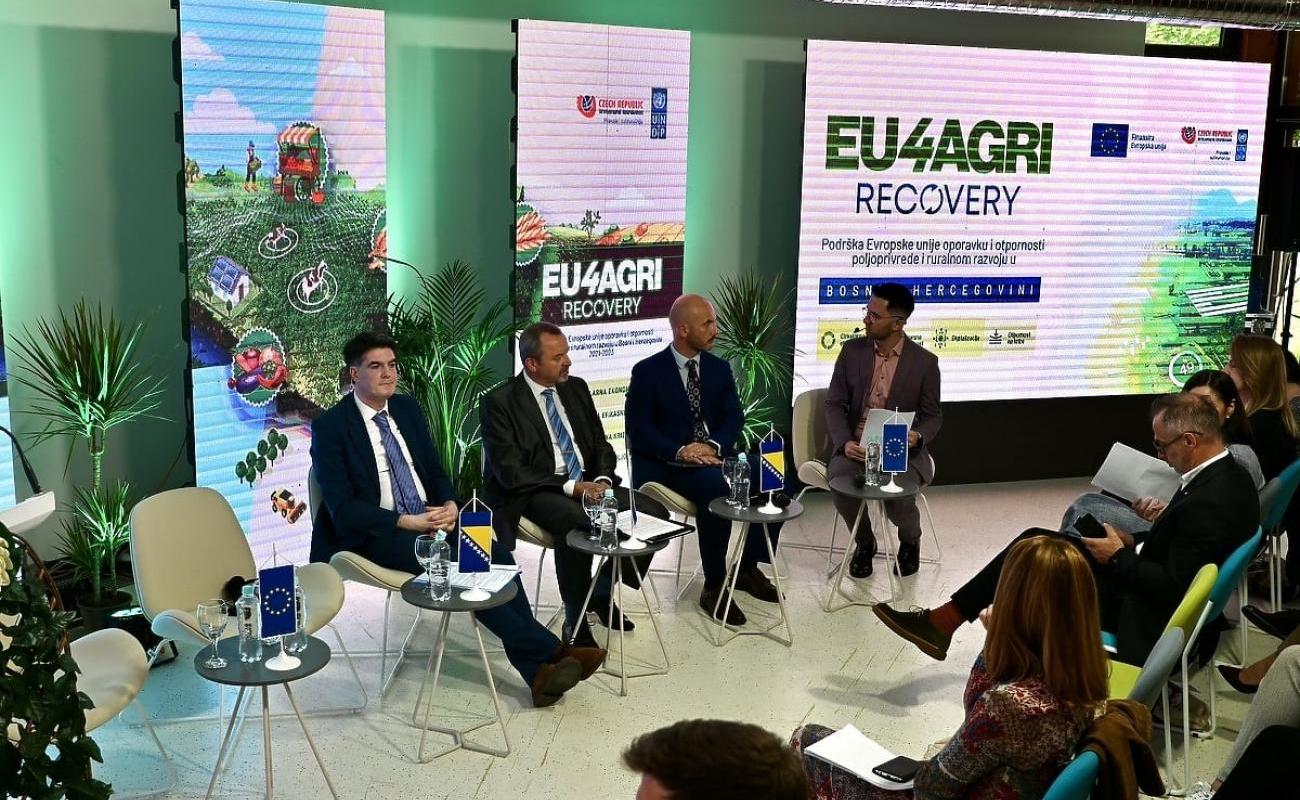The final event gathered a large number of attendees, including representatives of institutions, media, and more than 80 representatives of BiH companies from the agri-food sector. Supported companies adopted innovative solutions, resulting in the creation of 10 new sustainable products and services. The EU4AGRI-Recovery project strengthened the existing infrastructure and capacities of local companies, opening doors to further innovations and sustainable development practices in Bosnia and Herzegovina. Thanks to joint investments, companies now have improved resources to face future challenges, confirming the enhancement of sustainability and resilience of agri-food enterprises and rural tourism operators.
Gianluca Vannini, Head of Operations Section at the EU Delegation, emphasized that this project symbolizes the European Union’s commitment to helping when it is most needed, just as the EU remains a leader in supporting Bosnia and Herzegovina on its path to sustainable development and EU integration.
“This project, like the general support of the European Union to the agricultural sector in BiH, also helps producers become more resilient, adaptable to innovations, and environmentally aware, increasing their competitiveness. As BiH integrates deeper with the EU single market, products from BiH can and should be competitive across the continent,” Vannini highlighted.
Victor Munteanu, Deputy Resident Representative of UNDP in BiH, stressed the importance of sustainable development, noting that this project has enabled many farmers not only to overcome the crisis but also to build more resilient and sustainable business models.
“These targeted investments have improved resource efficiency, advanced production methods, and strengthened the sustainability and resilience of beneficiaries. In partnership with the institutions of Bosnia and Herzegovina, UNDP remains committed to supporting the Green Agenda and circular business models, ensuring business continuity and contributing to sustainable development and economic growth in Bosnia and Herzegovina,” Munteanu stated.
Josef Zrzavecký, Chargé d’Affaires of the Embassy of the Czech Republic in BiH, said that the Czech Republic offers its experiences as a partner to BiH, particularly in agriculture, to help BiH companies improve conditions for entering the EU market.
Local companies that received support have adopted new business solutions, such as high-protein gluten-free flour, biodegradable packaging for vegetables, and new albumin-based lubricating cheese.
“Greens from Sarajevo” invested in a machine that produces biodegradable packaging for vegetable seedlings, significantly reducing packaging waste and promoting environmentally friendly practices. Additionally, grape seed oil equipment was provided to three BiH wine producers, enabling them to start oil businesses and diversify their products. Drying equipment was also delivered to three more BiH wineries, allowing them to use grape residue to produce spices as an additional service, showcasing an innovative approach to waste reuse and resource efficiency. By increasing resource efficiency and cleaner production methods, the project has enabled the improvement of knowledge and strengthening of the sustainability and resilience of companies.
Moreover, the EU4AGRI-Recovery project has achieved significant milestones:
– Financial Support: The EU invested 10 million KM in the BiH agri-food sector through 78 projects.
– Employment: The project enabled the preservation of 1,463 jobs and created 142 new jobs, including 42 ‘green’ jobs that contribute to sustainable practices and reducing environmental impact.
– Training and Development: 158 individuals from the agri-food sector and rural tourism were trained, improving their capabilities for long-term resilience and sustainability.
– Innovative Solutions: 60 BiH companies were supported in implementing innovative solutions to improve their business operations.
The EU4AGRI-Recovery project, financed by the European Union with five million euros, was jointly implemented by the United Nations Development Programme (UNDP) and the Czech Development Agency (CzDA). This project complements the ongoing EU4AGRI project, which has been implemented since 2020, focusing on the advancement of the agri-food sector in Bosnia and Herzegovina.
Since 2020, the European Union has provided 35 million euros for agriculture and rural development, food safety, veterinary, and phytosanitary sectors in BiH. EU4AGRI and EU4AGRI-Recovery are leading projects in this sector, initiated to modernize the agri-food sector in BiH and to help its recovery from COVID-19 and ensure business continuity

